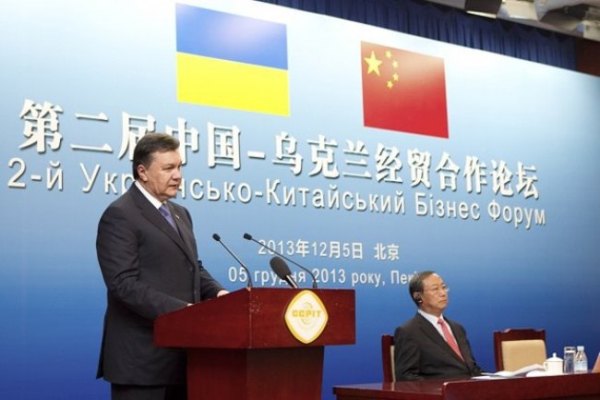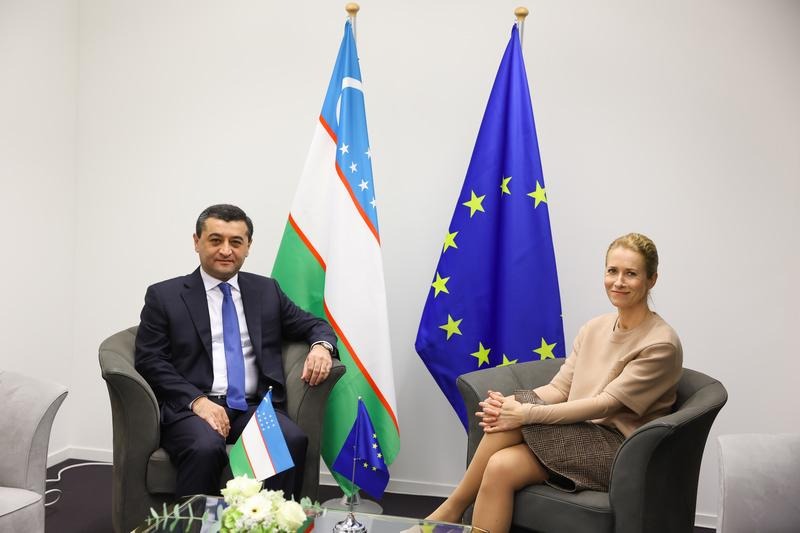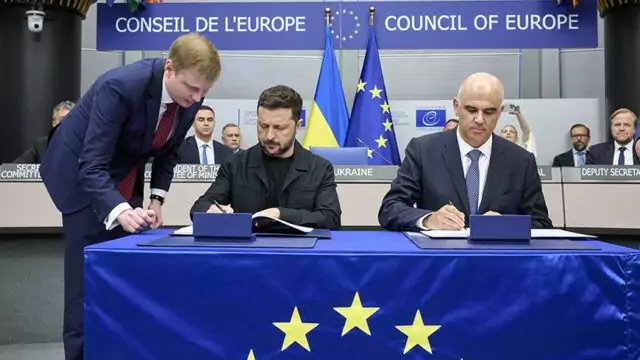
Sale of Crimean Land by Yanukovych: ‘Made in/for China’
Sale of Crimean Land by Yanukovych: ‘Made in/for China’
While most of the worldwide media outlets focused on Euromaidan protests in Kyiv since Ukraine’s withdrawal from signing the Association Agreement with the European Union in November 2013, the signing of a five-year economic agreement between Ukrainian President Viktor Yanukovych and several Chinese companies went unnoticed. In fact, while a group of activists were storming the presidential administration in Kyiv in December 2013, Yanukovych was not even in Ukraine. Instead, he was in China as the guest of honor of the Ukrainian-Chinese business forum in Beijing to authorize a memorandum on the construction of a deep-water mega-port in Crimea, contracted by the Ukrainian company “Kievgidroinvest” and the Chinese company Beijing Interoceanic Canal Investment Management (BICIM) (https://www.utro.ru/articles/2014/01/22/1170083.shtml).
During his visit to China, Yanukovych also signed a territorial “agreement” allowing the Chinese to lease about 160,000 hectares of Crimean land, well known for its fertile black soil, for the next 50 years, thus turning Crimea into a food-production colony for China. The Chinese will use the land for grain production (wheat, corn, soybean and barley), which they will export back from Crimea (https://www.centrasia.ru/newsA.php?st=1390536240). At present, China “leases” 7.4 million acres (3 million hectares) in countries with dire economic situation and immense financial loans, mostly in Africa and Latin America
The “Chinese tenants” have already announced that the projected amount of grain gathered in Crimea will initially be around 8 million tons yearly and gradually will increase to 20 million tons per year. According to the Crimean political scientist Sergei Kiselev, even in the most favorable years, corn and wheat production in Crimea does not exceed 2 million tons. This means that to gather 8–20 million tons of grain, the Chinese will need to inject enormous amounts of fertilizer into the Crimean soil (https://www.utro.ru/articles/2014/01/22/1170083.shtml) as they do in their rental farmlands in Africa, which can easily lead to chemical degradation, ecological imbalance and ground water contamination.
In the initial part of the project, the Chinese plan to invest $3 billion to build a new mega-port in Crimea, which will be similar to Lingang Industrial park in Shanghai (https://vesti.ua/krym/34387-kitaj-rassmotrit-vozmozhnost-stroitelstva-industrialnogo-parka-v-krymu). Some of this money will also go to the expansion and upgrading of the Sevastopol port, where the Russian Black Sea Fleet is located. According to this agreement, work will begin in 2014 and the first phase of the project will be completed within the next five years. In the second phase, the Chinese will pay $7 billion to Ukraine, which will be spent on airport construction, refineries and more port facilities (https://www.centrasia.ru/newsA.php?st=1390536240).
According to the owner of Beijing Interoceanic, billionaire Wang Jing, Chinese-Ukrainian cooperation will transform Crimea into the economic center of a nautical “Silk Road” that will link East with West (https://www.12online.ru/news/shyolkovyy-put-proydet-cherez-krym-ob-usilenii-kitaya-na-ukraine). Similarly, during an interview with the UNIAN news agency, the CEO of the Ukrainian company Kievgidroinvest, Alexei Mazyuk, told reporters that the deep-water mega port will be located in the Crimean town of Saki and will be used to redistribute cargo flows from the East to Europe, just like the historic Silk Road of Eurasia (https://www.unian.net/society/859685-kitay-investiruet-v-stroitelstvo-glubokovodnogo-porta-v-kryimu.html). Mazyuk is well known in Crimea for having carried out legally dubious and environmentally hazardous investments like shuttling pristine sand from Fiolent to the tourist beaches of Crimea (https://svpressa.ru/society/article/80697/).
It is important to note that Saki is a health destination, a spa resort town, well-known by domestic and international tourists, who for centuries have flocked to these areas for its therapeutic mineral-rich mud lakes, healing quartz sand in its purest form, and sanatoriums (https://www.thecrimea.org.ua/content/view/65/48/). The construction of the mega-port, which will include cargo terminals and warehouses for 20 million tons of grains and ocean-bound vessels, will entail a major digging process that will be at least 25 meters deep. Ecologists are concerned that removing that much sand from the bottom of the Black Sea coast could lead to beach erosion, floods, and the destruction of the healing mud lakes and golden beaches of Saki and Evpatoria (https://3rm.info/42963-chem-kitayskih-investorov-privlekaet-krym.html). In fact, a number of Crimean politicians, ecologists and agricultural experts have defined this lease agreement as a “death sentence” for Crimea (https://marv.livejournal.com/1821467.html). Notably, Ukraine lifted a ban on foreigners buying up land in the country during the Yanukovych era.
Many Crimean residents have compared Yanukovych’s actions with Joseph Stalin’s artificially created famines of 1932–1933 (also known as Holodomor), when Crimean and Ukrainian soil was used to grow food to feed the Russian nomenklatura while millions of local Ukrainian citizens died of hunger. As a result, Crimeans are circulating a petition on social media sites and the Internet titled “Ukrainian President Viktor Yanukovych [and] Chinese tycoon Wang Jing: Cancel the agreement on the construction of the Chinese mega-port in Crimea” (https://secure.avaaz.org/ru/petition/Prezidentu_Ukrainy_VFYanukovichu_kitayskomu_magnatu_Van_Czinu_otmenit_dogovorennosti_o_stroitelstve_kitayskogo_megaporta/).
The Ukrainian government faces $15.3 billion in maturing loans. The currency reserves of the Central Bank are plummeting fast, and as of October 31, 2013, Ukraine’s international reserves dropped to $20.6 billion (https://rt.com/business/ukraine-yanukovych-china-trip-647/). Thus, it appears that President Yanukovych is using the deal with China on Crimea as a way to address these serious national financial shortcomings—though seemingly at the expense of the peninsula’s ecological future, and regardless of the likely economic impact of thousands of Chinese workers who will come to work on these port construction sites and farm lands. When he became the president of China, Xi Jinping promoted the slogan “Chinese Dream” as “national rebuilding, improvement of livelihoods, prosperity, construction of a better society and military strengthening of China” (https://www.economist.com/news/leaders/21577070-vision-chinas-new-president-should-serve-his-people-not-nationalist-state-xi-jinping). But now Crimeans have to hope that as China vastly expands its economic presence on the peninsula, Xi’s “Chinese Dream” does not become a Crimean nightmare in the long run.


